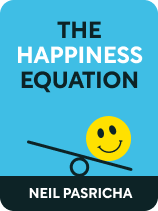

This article is an excerpt from the Shortform book guide to "The Happiness Equation" by Neil Pasricha. Shortform has the world's best summaries and analyses of books you should be reading.
Like this article? Sign up for a free trial here .
Can you hate your job and still be happy? Why do so many people continue working unfulfilling, soul-sucking jobs, not even trying to escape?
Considering you spend a third of your life working, that might be a tall order. Working an unfulfilling job day in and day out is soul-sucking, yet many people won’t even try to escape because they conceive of their work as something they have to endure.
Here’s how this line of thinking—that work is something you have to endure—erodes your happiness.
Working for the Weekend
Western society conditions you to value work only in terms of how it financially supports what you do in your free time—weekends, vacations, and eventual retirement. This attitude promotes two problematic ideas: First, happiness only comes from having free time. Second, work earns your free time and happiness. These ideas fuel the belief that work is simply a means to an end that you must endure.
Thinking of your job as something you have to endure has a massive impact on your overall happiness. If you hate your job, you’ll spend a third of your life feeling resentful and dissatisfied—assuming you spend about a third of your life at work. What’s worse, these negative feelings drain your energy and bleed over into the free time you work so hard to earn. You either feel too tired or frustrated about work to enjoy your free time, or you spend a large part of that time dreading your return to work.
Since retirement removes the need to work for free time, it’s easy to assume that it breaks this cycle of dissatisfaction. However, Pasricha argues that retirement makes you unhappy, both during your working life and after you retire:
- During your working life, planning to retire impels you to make sacrifices for the promise of a leisurely future. You follow the “work and save” formula and seek out well-paid jobs to fund your retirement account. But, well-paid jobs often require longer hours—so you end up with little free time to enjoy your life.
- Once you hit retirement, you risk feeling bored, useless, and dissatisfied. Pasricha explains that work provides a productive way to apply skills and knowledge, opportunities to take on challenges or make a contribution, and social stimulation. Without this structure, your free time feels like a void and no longer makes you happy.
(Shortform note: In addition to fueling feelings of dissatisfaction, the loneliness and inactivity caused by losing the structure of work also harm your mental and physical health. A recent study revealed that retirement increases the chances of suffering from clinical depression by 40%, and of being diagnosed with a physical illness by 60%.)
| Pursuing the American Dream Impedes Happiness The authors of Minimalism mirror Pasricha’s view that Western society is conditioned to view work as a “means to an end.” They clarify how pursuing the “American Dream”—which involves working hard for reliable pay and benefits just to buy free time and pleasure—creates four obstacles that impede happiness and keep you trapped in unsatisfying work: Identity: You believe that your career defines who you are. Mixing up your persona with your career makes it difficult to change occupations that no longer make you happy—because you fear abandoning who you are. Reputation: Each time you move up in your career, you increase your social standing. The higher your standing, the more you have to lose. Your fear of loss impels you to stick to a career you don’t enjoy and work harder and longer hours to maintain and improve your status. Reliability: You’re comfortable in your career and know what you’re doing. Attempting to pursue a different, more satisfying career takes you out of your comfort zone and feels risky—so you opt to stay comfortably unhappy. Finances: The longer you stay in your career, the more you increase your financial security and the benefits it offers, such as a retirement plan, stock options, and health insurance. These financial benefits justify staying in a job you hate. While these four aspects contribute to an unsatisfying career, retirement instantly removes them from your life. However, this only creates further obstacles to happiness. If you’re overly reliant on your work to define who you are, bolster your reputation, and provide reliability and financial security, you may struggle to figure out who you are and hows to fulfill these needs without your work. Becoming aware of how these four factors may be influencing your career choices is the first step to moving toward more satisfying work and planning how to spend your post-work years. |
Solution: Focus on Work That Satisfies You
Think of work not as a means to an end but as a means to satisfaction. Pasricha argues that work should be as enjoyable as free time. When you choose work that aligns with your interests and passions, you feel more engaged, motivated, and productive—and therefore happy—in that third of your life.
Make work more enjoyable by choosing a job you’d happily do in your free time. Integrate your list of enjoyable activities from Solution #2 with your knowledge and skills to come up with potential ideas for satisfying work.
(Shortform note: According to research in the area of positive psychology, Pasricha’s advice to align your work with your interests and passions also improves your chances of achieving career success. You’re more likely to feel motivated and experience increased feelings of happiness and satisfaction when you pursue career goals that genuinely interest you. This positive mental state allows you to access the best parts of yourself—your unique strengths and talents—and apply them to successfully achieve your goals.)
For your long-term strategy, Pasricha recommends substituting your goal to retire with an ongoing goal to look for challenging opportunities that keep you active and engaged. For example, you may continue to work, set learning goals, or volunteer for causes you care about.
(Shortform note: Following through with your goal to retire doesn’t guarantee unhappiness. Experts suggest, in addition to keeping yourself challenged, you can enjoy a happy retirement by engaging in meaningful activities, looking after your health, and making the effort to socialize with friends and family.)

———End of Preview———
Like what you just read? Read the rest of the world's best book summary and analysis of Neil Pasricha's "The Happiness Equation" at Shortform .
Here's what you'll find in our full The Happiness Equation summary :
- How to overcome the four common obstacles to happiness
- The five methods to reduce the toll of trivial tasks and decisions
- Why you need to stop chasing external validation






